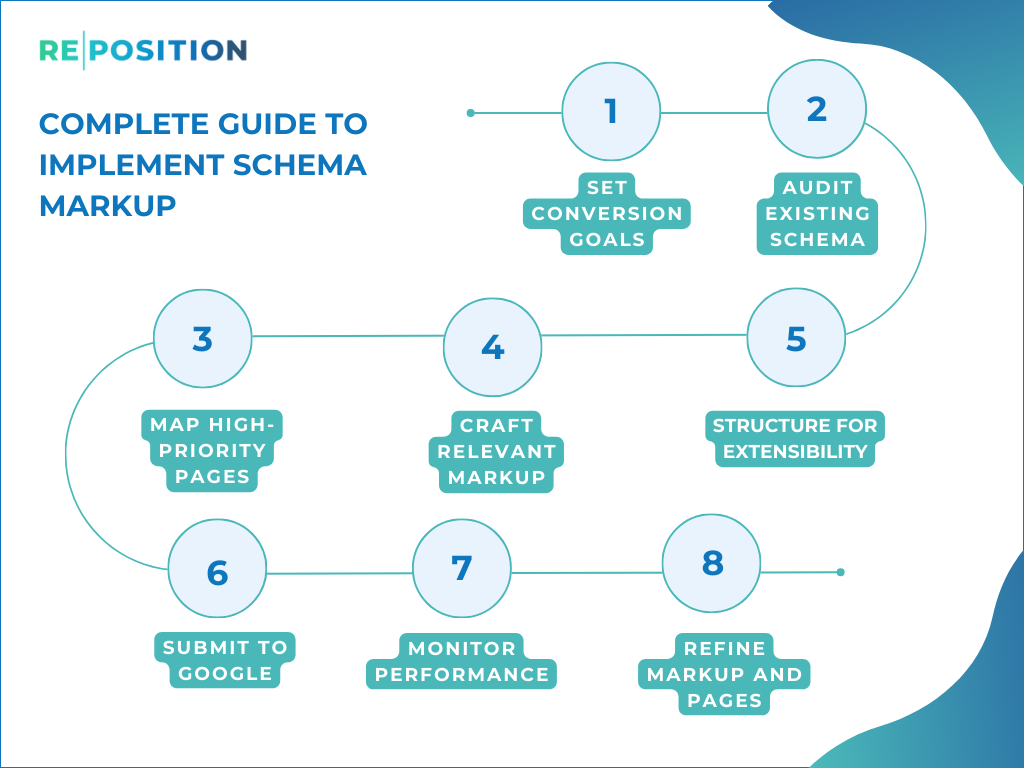As organic competition intensifies globally, brands need every possible leverage point to stand out in SERPs and earn those coveted top placements. Structured data markup represents one of the most impactful SEO opportunities – yet many brands leave this low-hanging fruit untouched.
Let us now understand in depth what is Schema Markup and why is it that important for SEO.
Schema markup refers to snippets of code called “microdata” that web developers add to individual pages to better describe and standardize elements like events, products, articles, videos, and more for search engines.
Schema elements include:
Altogether these schema microdata pieces annotate and enrich page elements to paint a clearer picture for Google around topics and experiences on each URL.
When deployed effectively, schema markup delivers 3 main conversion-focused SEO advantages:

Rich Snippet Placement
Google awards relevant pages enriched with schema markup special visibility and real estate in the form of rich snippets and knowledge panels. For example, review stars for local businesses, performing artist carousels, and product imagery rely on properly structured data to activate and draw attention over standard blue links. Claiming these special integrations helps pages stand out.
Improved CTR From Snippets
Thanks to catching user attention with images, buttons and interactive elements only accessible through markup, studies show rich snippets lift click-through rates substantially over standard results. Some estimate schema helped increase CTRs from under 5% to over 30% – showcasing the bottom-line impact structured data wields.
Higher Quality Scores
Well-deployed schema signals to Google algorithms a commitment to crafting content expressly suited to searcher intent around specific topics from local business info to events and more. In turn, pages brimming with relevant schema data receive a noticeable boost in rankings quality score which flows down to better SERP placement.
Any pages showcasing unique elements that would benefit from rich result previews in Google search warrants the implementation of structured data markup. Generally, pages that highlight special entities like local businesses, products, blog posts, events, recipes, and more should be annotated with schema.
Specifically, focus initial schema markup efforts on these key page types:
Location Pages
For any pages emphasizing a brick-and-mortar establishment or local presence like stores, restaurants, hotels etc – detail addresses, opening hours, images and other attributes through LocalBusiness schema. This activates map embeds, review stars and other on-SERP previews.
Individual Product Pages
Making products stand out with expanded imagery, pricing, stock status and badging in results relies on robust Product schema. Ensure each product SKU sold online has its page marked up to maximize chances of gaining rich snippets.
Product Category Archives
Add markup like aggregate rating tags and bestseller badging to group product pages featuring multiple items users often sort and scan through. Showcase the most popular or highly rated products within wider inventories.
Blog Article Pages
Pages featuring long-form articles around themes warrant BlogPosting schema that shares author info, images, date published, topics, headlines and deck excerpts in search. This draws the reader’s attention.
Event Pages
Enable event date, location and registration details to appear directly in results for one-off occasions like conferences through centrally-located knowledge panels by using Event schema tags.
Class Pages
Similar to events, markup course and class pages to spotlight critical details on the subject matter covered, prerequisites, prices, teachers, formats and duration right in search results where reader attention concentrates.
Contact & About Pages
Lastly, don’t forget foundational pages like Contact Us and About pages explaining who you are and how to get in touch. Schema pieces like PostalAddress, GeoCoordinates, OpeningHours and more help.
The key is identifying where you already rank for commercial terms and can leverage markup to stand out with media-rich result embeds that demonstrate your unique value right in the SERPs. Determine which pages align with searcher demand and expectation for schema markup guidance.
Hundreds of different schema pieces are recognized by Google across various themes. But begin by focusing on markup around your core content types and conversion goals.
Popular starter schema includes:
Local Business
Outlines key details on brick-and-mortar including opening hours, images and address. Activates map embeds and reviews stars where relevant.
FAQ Page
Call attention to expert answers to frequent customer questions with FAQ schema that enables toggling answer visibility.
How-To
Share step-by-step instructions through numbered flow schema that searchers can jump between via rich snippets.
Blog Posting
Annotate article themes including images, authors, dates and topics to activate blogger cards and extended text snippets.
Event
Boost visibility into upcoming conferences, meetups and occasions by detailing event names, dates, and locations plus images and descriptions.
Course
For online classes and training workshops, course schema highlights subjects covered, requirements, prices and formats through search embed.
Recipe
Spotlight cooking directions searchers crave details on ingredients, diets, cook times, images and numbered steps.
Product
Lastly, identify commercial items for sale like menu items, parts or retail goods with pricing, images, inventory counts and badging for trends like “bestseller” etc.
Follow Google’s structured data guidelines to select the appropriate item type and traits per page. Their testing tool helps validate proper schema deployments.
Executing a structured data markup implementation calls for coordinating efforts across IT, content and analytics to SEO audit, deploy, monitor and iterate on snippets over time.

Here is step-by-step blueprint:
Set Conversion Goals
Start by setting clear ROI objectives tied to rich results for schema like increased CTRs on key pages or higher lead form fill rates. This focuses efforts on high-impact page targets versus blanket coverage.
Audit Existing Schema
Leverage Google’s Structured Data Testing Tool to automatically scan site pages and identify where schema already exists. Review current snippets to eliminate any errors and supplement any incomplete yet relevant schema.
Map High-Priority Pages
Based on core searcher intents and conversion pages, map out URLs where you want to activate new rich snippets like local knowledge cards or review stars. Outline exactly what supplementary info schema would showcase per page.
Craft Relevant Markup
With page types defined, work with developers to add structured data code blocks adhering to Google’s design guidelines for proper syntax and attributes. Ensure your expanded details accurately reflect each page’s unique focus.
Structure For Extensibility
Rather than hard-coding schema directly into page templates, leverage JSON-LD markup within external scripts that can be easily maintained and expanded across any templates as needed in the future.
Submit To Google
Notify Google of new structured data additions directly through Google Search Console for pages. This helps expedite discovery and snippet activation through manual inspection and consideration.
Monitor Performance
Analyze site analytics to gauge early schema impact and achievement of conversion goals from the initiative like increased site searches or clicks from carousels. Also, watch the search impression volume for target pages.
Refine Markup And Pages
Review searcher satisfaction metrics and tweak structured data for maximum relevance. Enhance actual page content quality for better alignment with markup details searchers now see.
Deploying structured data to unlock rich snippets offers incredible SEO returns thanks to higher visibility, improved CTRs and authority signals. And robust schema infrastructure built today lays the foundation to capitalize on inevitable search algorithm advances like conversational AI and augmented reality previews.
Ready to equip your SEO strategy with the ultimate integration through comprehensive structured markup? The technical SEO consultants at Reposition Asia offer end-to-end implementation guidance from audits to page enhancement. Schedule a consultation today to start mapping out your markup rollout plan.